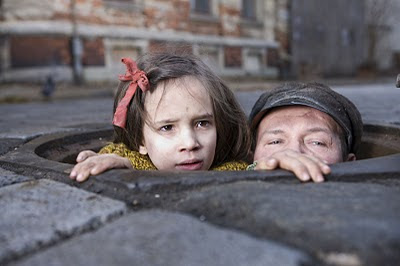This post continues to chronicle my attendance at the Telluride at Dartmouth program at the Hopkins Center for the Arts. Days 1 & 2 (A Dangerous Method and Albert Nobbs) can be found here, Day 3 (We Need to Talk About Kevin) can be found here.
I resisted In Darkness because it is a Holocaust film, and that is just about my least favorite movie genre. Nonetheless, it is a genre I'm deeply familiar with, and was the subject of the first serious film book I ever read, the original edition of Annette Insdorf's Indelible Shadows, which I discovered on my father's bookshelves when I was in high school. Soon after, I saw Schindler's List and found it deeply moving in a very adolescent way (on my part, at least, and maybe on Spielberg's). Later, I realized that Schindler's List had created a sort of emotional smugness in me -- it had made me feel good about feeling all the appropriate emotions. Spielberg is one of the greatest manipulators of emotion that the cinema has ever seen, and part of the pleasure of his action films, especially, lies in surrendering to them, allowing our emotions to be played by a virtuoso. I resist this in his films about something more serious than excitement; my loathing of The Color Purple and Munich is boundless and perhaps even a bit irrational -- indeed, I may resent the manipulation so much that I tend to perceive it as worse (cinematically and morally) than it is. At the same time, I desire great art to help us understand the Nazi era and its aftermath -- Paul Celan is my favorite 20th century poet, perhaps because so much of the power I perceive in his words derives from a struggle with (and against) the representation of atrocity. The problem is that for me it has to be great art. Plenty of subjects can withstand mediocre, ordinary, awkward, or bad art. Art that takes the Nazi years as its subject and ends up, in my estimation, to be less than great feels like a trivialization, and it infuriates me.
In any case, this is the background I brought to In Darkness, and explains why I spent the first half hour or so with my arms folded and jaw clenched -- I had pretty well decided that whatever magic spells this film tried to cast, I would resist them.
In Darkness tells the story of the final liquidation of the ghetto in Lvov, Poland, in June 1943 and of a group of Jews who hid in the city's sewers to survive. They were aided by Leopold Socha, a sewer worker, whose original goals were mercenary -- in the film, he is represented as a scavenger and thief, and tension is built early on because we fully expect him to take the Jews' money and then turn them over to the Germans for a reward. This is not what happens, though, and one path of the narrative is the story of Socha's redemption.
Had that been the primary path of the narrative, I would have hated In Darkness, because using the Holocaust as a plot device for tales of redemption seems despicable to me. (Millions of people died, and thus Our Protagonist found the goodne
2 Comments on Telluride at Dartmouth: In Darkness, last added: 10/2/2011
Display Comments
Add a Comment




I have always really liked Agnieszka Holland's films. Will probably see this one...in 2014 when it finally reaches the Tallahassee Backwater... jeffv
Since Sony picked up US distribution for it recently and it's the Polish entry for the Academy Awards (very likely nominee, good chance of being the winner), I expect it will be at least available on DVD/on-demand by the spring.
Except if Rick Scott's executive order banning all films in languages other than English from being distributed in Florida survives the court challenge...